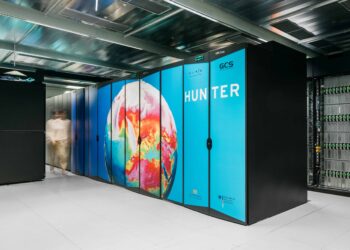Lenovo Data Center Group (DCG) announced it will deliver high-performance computer (HPC) infrastructure for SURF, the ICT cooperative for education and research in the Netherlands. The €20 million project, which begins in early 2021, will result in the creation of the largest and most powerful supercomputer in the country.
Supporting scientists from over 100 education and research institutions throughout the Netherlands, the supercomputer will power highly complex calculations in life-enhancing work across all fields of science including meteorology, astrophysics, medical and social sciences, and materials and earth sciences, such as climate change research.
Explaining the significance of this collaboration, and the benefits to be passed on to research projects, Walter Lioen, Research Services Manager at SURF, said, “The need of researchers for computing power, data storage and processing is growing exponentially. In the design of the new supercomputer, the usability for scientific research was paramount. SURF has chosen Lenovo because of its quality, performance and future flexibility, as well as its considerations for sustainability.”
Powering innovation alongside key partners
Lenovo HPC technology will include Lenovo ThinkSystem servers, powered by 2nd Gen AMD EPYC processors and ThinkSystem servers powered by future generation AMD EPYC processors, and all being cooled by Lenovo Neptune water cooling technology. 12,4 Pebibyte (PiB) of Lenovo Distributed Storage Solution (DSS-G) and servers with NVIDIA HGX A100 4-GPU will also assist with the artificial intelligence and machine learning abilities required for SURF’s innovative research. NVIDIA Mellanox HDR 200Gb/s InfiniBand, with smart in-network computing acceleration engines, provide the extremely low latency, high data throughput networking. Running at ten-times the capacity of the previous system and achieving an overall peak performance of almost 13 PFLOPs, Lenovo’s smarter infrastructure will deliver a powerful, highly efficient and sustainable tool for scientists and researchers in the future.
Energy efficiency through water-cooling technology
While optimal performance is a necessity for the SURF Dutch National Supercomputer, it is also vitally important to ensure the system is energy efficient. Lenovo’s water-cooling technology will remove approximately 90% of the heat from the system, reducing overall energy consumption, significantly increasing overall efficiency and ultimately allowing the processors to perform at their peak.
Tina Borgbjerg, General Manager for Benelux and Nordics, Lenovo DCG, says, “We’re so pleased to contribute to a project that will not only enrich scientific research in the Netherlands but deliver a smarter and more energy-efficient system, thanks to our incredible water-cooling technology. The sheer power that will be delivered by this national supercomputer showcases our strength in HPC, and the scale of this deal further demonstrates our commitment to the Benelux region and the Netherlands.”
“Our partnership with SURF shows our continued commitment to delivering innovative HPC technology to empower those who help solve humanity’s greatest challenges,” said Noam Rosen, EMEA Director, HPC & AI at Lenovo DCG. “Harnessing the capabilities of the dawning exascale era of computing and putting them in the hands of organisations like SURF for ground- breaking research is what Lenovo’s ‘From Exascale to Everyscale’ initiative is all about.”
The modernisation of the infrastructure will begin in February 2021 and phase 1 of the new supercomputer is expected to be operational by mid-2021.










Discussion about this post